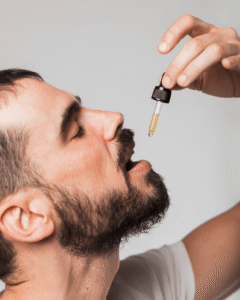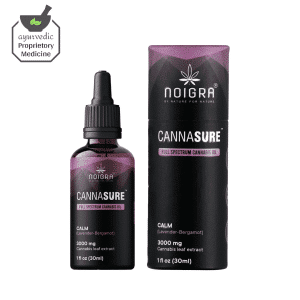Overview
Migraines go beyond headaches caused by stress or allergies. Their duration varies from 4 to 72 hours. Symptoms can be aggravated even by simple, mundane activities like moving, being around noise, or being around light. Even though pain medications may provide temporary relief from migraine attacks, their side effects may worry you. Cannabidiol (CBD) may prove useful here. Cannabis contains a variety of active constituents, including CBD. It is becoming increasingly popular as a natural treatment for certain medical conditions.
Top CBD Oil for Migraine Available in India
What does the research state about CBD?
A limited amount of research has been conducted on the use of CBD oil for migraine in India. There have been studies on the combined effects of CBD and tetrahydrocannabinol (THC), a different cannabinoid. There have been no published studies that examine CBD’s effects on migraines as a single ingredient.
Research on CBD is limited because of regulations and obstacles associated with legalizing cannabis. Even so, some laboratory studies suggest that CBD oil may have benefits for chronic and acute pain, including migraines.
Study on CBD and THC
A group of researchers presented the results of their study on cannabinoids and migraine prevention at the 3rd Congress of the European Academy of Neurology (EAN) in 2017.
A combination of two compounds was given to 48 people with chronic migraines during the first phase of their study. A compound containing 19% THC contained virtually no CBD, while another contained 9% CBD and virtually no THC. The compounds were taken orally. There were no effects from doses under 100 milligrams (mg). A 55% reduction in acute pain was observed when the doses were increased to 200 mg.
A second phase of the study focused on migraine and cluster headaches. 79 people with chronic migraines received either 200 mg of the THC-CBD combination from phase I or 25 mg of amitriptyline, a tricyclic antidepressant, daily.
A daily dose of 200 mg THC or 480 mg verapamil, a calcium channel blocker, was given to 48 people with cluster headaches in phase I. The treatment period lasted for three months, and the follow-up was four weeks after the end of treatment.
Migraine attacks were reduced by 40.4% with the THC-CBD combination, and by 40.1% with amitriptyline. The combination of THC and CBD also reduced the intensity of pain by 43.5%. Cluster headache sufferers only saw a slight reduction in the severity and frequency of their headaches.
Some did, however, experience a 43.5% reduction in pain intensity. Pain intensity dropped only in participants with migraine attacks that started in childhood. Researchers found that cannabinoids were only effective for treating acute cluster headaches if the patient had experienced migraine attacks as a child.
How to use CBD
While lawmakers are currently debating the merits of cannabis and related products, it’s not a new discovery that the plant can treat a variety of ailments.
The NCCIH (National Center for Complementary and Integrative Health) states that Cannabis has been used in alternative medicine for over 3,000 years. Some of these uses include the management of Pain, Neurological symptoms and Inflammation
CBD oil can be:
- Ingested
- Applied topically
- Hemp Cigarettes
To start:
- Under your tongue, place a few drops of the oil
- Consume CBD capsules
- You can eat or drink CBD-infused treats
It may be beneficial to vape CBD oil if you have a severe migraine at home and do not want to leave.
The National Cancer Institute (NCI) explains that inhalation delivers compounds much quicker to the bloodstream than other methods.
The proper dosage for a migraine attack does not yet have any formal guidelines. Consult your doctor to determine the appropriate dosage.
CBD oil should be used at the smallest dose possible if you’re new to it. Work your way up to the full dose gradually. Your body will become accustomed to the oil and you’ll be less likely to experience side effects.
Potential side effects of CBD
There are few side effects associated with CBD and CBD oil, according to studies. One of the main reasons why people choose not to take over-the-counter (OTC) or addictive prescription pain medications is because they can become addictive.
It is possible to experience fatigue, drowsiness, an upset stomach as well as changes in appetite and weight. Furthermore, mice force-fed extremely high doses of CBD-rich cannabis extract have also experienced liver toxicity.
Depending on how you use CBD oil, you may experience side effects. Vaping, for example, may irritate your lungs. This can result in:
- chronic cough
- wheezing
- breathing difficulties
Your doctor may advise you against vaping CBD oil if you have asthma or another type of lung disease.
If you have any questions about the potential side effects or how your body might handle them, talk to your doctor.
Be careful of drug interactions if you’re also taking other medications or dietary supplements. Drugs such as antibiotics, antidepressants, and blood thinners may interact with CBD.
If you take a medication or supplement that interacts with grapefruit, be especially cautious. Both CBD and grapefruit interact with enzymes involved in drug metabolism, like cytochrome P450 (CYPs).
Can CBD get you high?
Cannabis CBD oils don’t always contain THC, but they are made from cannabis. When users smoke cannabis, THC is the cannabinoid that causes them to feel “high” or “stoned”.
On the market, CBD strains can be found in two forms:
- dominant
- rich
THC is low in CBD-dominant strains, whereas CBD-rich strains contain both cannabinoids.
CBD without THC has no psychoactive effects. According to the nonprofit Project CBD, CBD often is able to counteract the effects of THC in combination products. This is one of the many reasons you may prefer CBD oil to medical marijuana.
Legality
India has legalized hemp and CBD products, approved by the Ayush Ministry and the FDA. Anyone with the proper certification can sell these products, and anyone who wants to purchase them must have a valid prescription.
CBD oil needs more research before it can become a mainstream treatment option for migraines, but if you’re interested you might want to speak to your doctor. Your doctor will be able to advise you on dosage and legalities.
As with any migraine treatment option, CBD oil should be treated with the same level of care. You may need to adjust the dosage to suit your needs if it takes some time for it to work.





